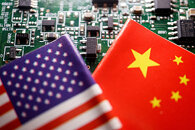- Joined
- May 21, 2024
- Messages
- 1,143 (3.50/day)
The Biden administration is rolling out a third major export control package aimed at China's semiconductor industry, as per a report from Reuters. Estimated to affect 140 companies, including China's chip equipment maker Naura Technology Group, Piotek, and Huawei Technologies, the effort aims to limit China's access to advanced chip making technology. In particular, technology that could be used in military products and artificial intelligence. Important sanctions include export controls to specific chip equipment manufacturers, blocking the delivery of high-performance memory chips and the addition of several semiconductor investment companies to the list of export-restricted entities.
The package expands U.S. regulatory authority through foreign direct product rules. It regulates chip manufacturing equipment manufactured around the world with U.S. technology, Japan and the Netherlands are exempt. However, the rules could have an impact on manufacturers outside U.S. such as those based in Israel, Malaysia, Singapore, South Korea, Taiwan and non-U.S. firms (i.e. ASML) due to the complexity of the technological and supply chain. This continues the Biden administration's strategy to limit China's semiconductor capabilities and comes just weeks before the Trump administration made changes. When asked about US new restrictions Chinese Foreign Ministry spokesperson Lin Jian said at a regular press conference on Monday that such behavior undermines the international economic and trade system, and disrupts global supply chains. China will take measures to protect companies' rights and interests.

Among the measures are limits on high-bandwidth memory (HBM) shipments. The latest round of regulations will limit memory used in AI chips compliant with "HBM 2" and more advanced versions. Even if Micron in the US and South Korean memory giants Samsung and SK hynix are all manufacturing HBM products, reports indicate that Samsung will be the most affected. According to sources cited by Reuters, China's chip demand is focused primarily on the HBM2E, which is two generations after the current state-of-the-art HBM3e. Moreover, for the first time, two chip investment companies have been included on the Entity List, Chinese private equity firm Wise Road Capital and technology company Wingtech Technology.
View at TechPowerUp Main Site | Source
The package expands U.S. regulatory authority through foreign direct product rules. It regulates chip manufacturing equipment manufactured around the world with U.S. technology, Japan and the Netherlands are exempt. However, the rules could have an impact on manufacturers outside U.S. such as those based in Israel, Malaysia, Singapore, South Korea, Taiwan and non-U.S. firms (i.e. ASML) due to the complexity of the technological and supply chain. This continues the Biden administration's strategy to limit China's semiconductor capabilities and comes just weeks before the Trump administration made changes. When asked about US new restrictions Chinese Foreign Ministry spokesperson Lin Jian said at a regular press conference on Monday that such behavior undermines the international economic and trade system, and disrupts global supply chains. China will take measures to protect companies' rights and interests.

Among the measures are limits on high-bandwidth memory (HBM) shipments. The latest round of regulations will limit memory used in AI chips compliant with "HBM 2" and more advanced versions. Even if Micron in the US and South Korean memory giants Samsung and SK hynix are all manufacturing HBM products, reports indicate that Samsung will be the most affected. According to sources cited by Reuters, China's chip demand is focused primarily on the HBM2E, which is two generations after the current state-of-the-art HBM3e. Moreover, for the first time, two chip investment companies have been included on the Entity List, Chinese private equity firm Wise Road Capital and technology company Wingtech Technology.
View at TechPowerUp Main Site | Source







 I've seen people say in this topic this has to do with the age of a certain generation. But they forget that the youngsters too, grow old someday, and they'll be in the exact same place doing the exact same things. We've written a history full of repeat offenses. Why would it be different now? Already you can see the younger generations are in fact just as easily manipulated, if not easier, and are also keen to find opposition, even just for entertainment. I'm not seeing a promising new world on the horizon honestly. The younger generations don't consume less, either, they're fed and feeding on hypercapitalism just the same, and social media is even teaching them how that world works: be a brand, sell yourself, influence others.
I've seen people say in this topic this has to do with the age of a certain generation. But they forget that the youngsters too, grow old someday, and they'll be in the exact same place doing the exact same things. We've written a history full of repeat offenses. Why would it be different now? Already you can see the younger generations are in fact just as easily manipulated, if not easier, and are also keen to find opposition, even just for entertainment. I'm not seeing a promising new world on the horizon honestly. The younger generations don't consume less, either, they're fed and feeding on hypercapitalism just the same, and social media is even teaching them how that world works: be a brand, sell yourself, influence others.